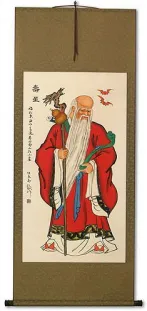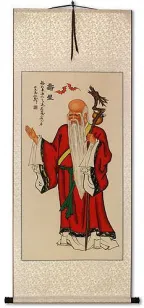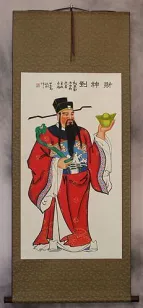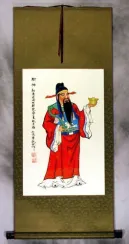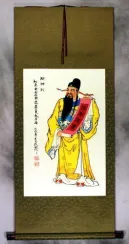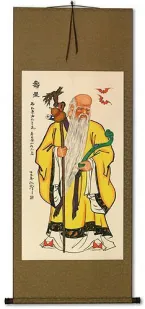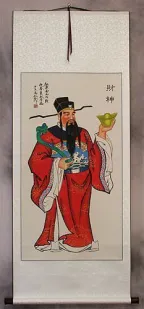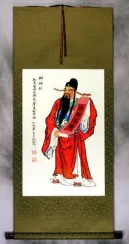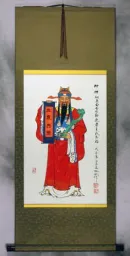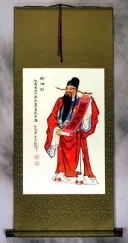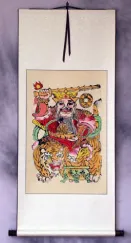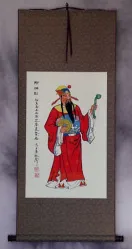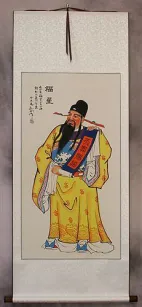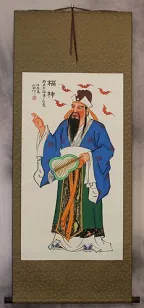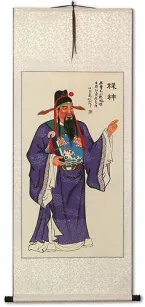Many custom options...
And formats...

Not what you want?
Try other similar-meaning words, fewer words, or just one word.
Feel free to email me with your request. If it's easy, I'll translate it for free and add it to this database of calligraphy for you.
The name God of Wealth in Chinese / Japanese...
Sorry! There's currently no match for God of Wealth in the calligraphy database...
If you want a special phrase, word, title, or proverb, feel free to contact me, and I'll translate your custom calligraphy idea for you.
Below are some entries from our dictionary that may match your god of wealth search...
| Characters If shown, 2nd row is Simp. Chinese |
Pronunciation Romanization |
Simple Dictionary Definition |
夜叉 see styles |
yè chā ye4 cha1 yeh ch`a yeh cha yasha やしゃ |
yaksha (malevolent spirit) (loanword); (fig.) ferocious-looking person yaksha (Buddhist guardian deities sometimes depicted as demonic warriors) (san: yaksa); (given name) Yasha 乞叉; 藥叉; 閱叉 yakṣa, (1) demons in the earth, or in the air, or in the lower heavens; they are malignant, and violent, and devourers (of human flesh). (2) The 八大將, the eight attendants of Kuvera, or Vaiśravaṇa, the god of wealth; those on earth bestow wealth, those in the empyrean houses and carriages, those in the lower heavens guard the moat and gates of the heavenly city. There is another set of sixteen. The names of all are given in 陀羅尼集經 3. See also 羅 for rakṣa and 吉 for kṛtya. yakṣa-kṛtya are credited with the powers of both yakṣa and kṛtya. |
大黒 see styles |
daikoku だいこく |
(1) (abbreviation) (See 大黒天) god of wealth; (2) (archaism) monk's wife; (place-name, surname) Daikoku |
比干 see styles |
bǐ gān bi3 gan1 pi kan |
Bi Gan (Chinese god of wealth) |
財神 财神 see styles |
cái shén cai2 shen2 ts`ai shen tsai shen Zaijin |
god of wealth Kuvera, v. 倶 Vaiśravaṇa, v. 毘the god of wealth. |
倶毘羅 倶毘罗 see styles |
jù pí luó ju4 pi2 luo2 chü p`i lo chü pi lo kubira |
(1) kumbhīra, crocodile; also鳩鞞羅; 倶尾羅. (2) Kuvera, Kubera, the guardian king of the north, v. 毘沙門 Vaiśravaṇa, the god of wealth. |
四天王 see styles |
sì tiān wáng si4 tian1 wang2 ssu t`ien wang ssu tien wang shitennou / shitenno してんのう |
(1) {Buddh} the Four Heavenly Kings (Dhrtarastra, Virudhaka, Virupaksa, and Vaisravana); (2) the big four (i.e. four leaders in a given field) (四大天王) catur-mahārājas, or Lokapālas; the four deva-kings. Indra's external 'generals 'who dwell each on a side of Mount Meru, and who ward off from the world the attacks of malicious spirits, or asuras, hence their name 護世四天王 the four deva-kings, guardians of the world. Their abode is the 四天王天 catur-maharāja-kāyikas; and their titles are: East 持國天 Deva who keeps (his) kingdom; colour white; name Dhṛtarsaṣtra. South 增長天 Deva of increase and growth; blue; name Virūḍhaka. West 廣目天 The broad-eyed (also ugly-eyed) deva (perhaps a form of Siva); red; name Virūpākṣa. North 多聞天 The deva who hears much and is well-versed; yellow; name Vaiśravaṇa, or Dhanada; he is a form of Kuvera, the god of wealth. These are the four giant temple guardians introduced as such to China by Amogha; cf. 四天王經. |
大黑天 see styles |
dà hēi tiān da4 hei1 tian1 ta hei t`ien ta hei tien Daikoku ten |
Mahākāla 摩訶迦 (or 謌) 羅 the great black deva 大黑神. Two interpretations are given. The esoteric cult describes the deva as the masculine form of Kālī, i.e. Durgā, the wife of Śiva; with one face and eight arms, or three faces and six arms, a necklace of skulls, etc. He is worshipped as giving warlike power, and fierceness; said also to be an incarnation of Vairocana for the purpose of destroying the demons; and is described as 大時 the "great time" (-keeper) which seems to indicate Vairocana, the sun. The exoteric cult interprets him as a beneficent deva, a Pluto, or god of wealth. Consequently he is represented in two forms, by the one school as a fierce deva, by the other as a kindly happy deva. He is shown as one of the eight fierce guardians with trident, generally blue-black but sometimes white; he may have two elephants underfoot. Six arms and hands hold jewel, skull cup, chopper, drum, trident, elephant-goad. He is the tutelary god of Mongolian Buddhism. Six forms of Mahākāla are noted: (1) 比丘大黑 A black-faced disciple of the Buddha, said to be the Buddha as Mahādeva in a previous incarnation, now guardian of the refectory. (2) 摩訶迦羅大黑女 Kālī, the wife of Śiva. (3) 王子迦羅大黑 The son of Śiva. (4) 眞陀大黑 Cintāmaṇi, with the talismanic pearl, symbol of bestowing fortune. (5) 夜叉大黑 Subduer of demons. (6) 摩迦羅大黑 Mahākāla, who carries a bag on his back and holds a hammer in his right hand. J., Daikoku; M., Yeke-gara; T., Nag-po c'en-po. |
大黒天 see styles |
daikokuten だいこくてん |
(1) {Buddh} Mahakala (incarnation of Mahesvara); (2) Daikokuten (god of wealth); (place-name) Daikokuten |
大黒鼠 see styles |
daikokunezumi; daikokunezumi だいこくねずみ; ダイコクネズミ |
(1) white rat; (2) white rat that serves Daikoku (god of wealth) |
毘沙門 毘沙门 see styles |
pí shā mén pi2 sha1 men2 p`i sha men pi sha men bishamon びしゃもん |
(place-name) Bishamon (毘沙門天王) Vaiśravaṇa. Cf. 財 and 倶. One of the four mahārājas, guardian of the North, king of the yakṣas. Has the title 多聞; 普聞; universal or much hearing or learning, said to be so called because he heard the Buddha's preaching; but Vaiśravaṇa was son of Viśravas, which is from viśru, to be heard of far and wide, celebrated, and should be understood in this sense. Vaiśravaṇa is Kuvera, or Kubera, the Indian Pluto; originally a chief of evil spirits, afterwards the god of riches, and ruler of the northern quarter. Xuanzong built a temple to him in A. D. 753, since which he has been the god of wealth in China, and guardian at the entrance of Buddhist temples. In his right hand he often holds a banner or a lance, in his left a pearl or shrine, or a mongoose out of whose mouth jewels are pouring; under his feet are two demons. Colour, yellow. |
福の神 see styles |
fukunokami ふくのかみ |
god of fortune; god of wealth |
財神爺 财神爷 see styles |
cái shén yé cai2 shen2 ye2 ts`ai shen yeh tsai shen yeh |
god of wealth; very wealthy man |
趙公明 赵公明 see styles |
zhào gōng míng zhao4 gong1 ming2 chao kung ming |
Zhao Gongming, God of Wealth in the Chinese folk tradition and Taoism |
趙玄壇 赵玄坛 see styles |
zhào xuán tán zhao4 xuan2 tan2 chao hsüan t`an chao hsüan tan |
Zhao Xuantan, God of Wealth in the Chinese folk tradition and Taoism |
趙公元帥 赵公元帅 see styles |
zhào gōng yuán shuài zhao4 gong1 yuan2 shuai4 chao kung yüan shuai |
Marshal Zhao, aka Zhao Gongming or Zhao Xuantan, God of Wealth in the Chinese folk tradition and Taoism |
ダイコクネズミ see styles |
daikokunezumi ダイコクネズミ |
(1) white rat; (2) white rat that serves Daikoku (god of wealth) |
This in-stock artwork might be what you are looking for, and ships right away...
Gallery Price: $200.00
Your Price: $69.88
God of Money and Prosperity
Cai Shen
Chinese Scroll
Discounted Blemished
Gallery Price: $120.00
Your Price: $45.00
Lu Xing
God of Money and Prosperity
Wall Scroll
Discounted Blemished
Gallery Price: $71.00
Your Price: $39.00
Successful Chinese Character and Japanese Kanji calligraphy searches within the last few hours...
